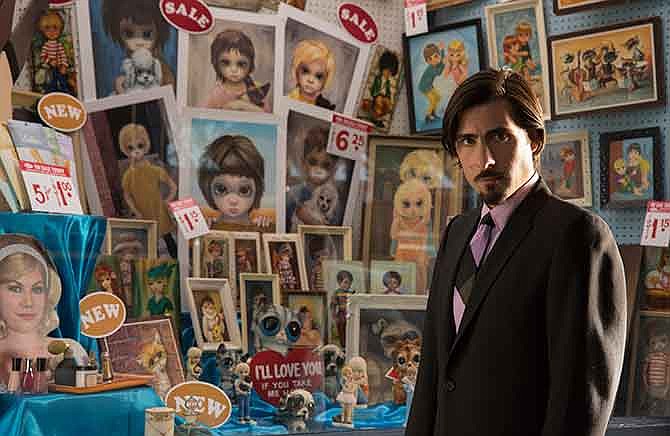You've likely seen the images, even if you have no idea who painted them: Those waifs with the huge, saucer-like eyes, appearing in oil paintings, posters, postcards, refrigerator magnets.
Actually, for years, nobody actually knew who painted them.
That's because Walter Keane, a showboating sociopath, claimed credit, when it was his wife, Margaret, who actually was the sole artist, closeted away in a home studio filled with turpentine fumes. It was an epic story of art fraud that ended with a dramatic 1986 trial in which Margaret proved her case by painting a doe-eyed child right in front of the judge.
It's interesting that in this season packed with movies based on real-life stories about genius and bravery, we have, in the same week, two high-profile films about painters. Yet the stories they tell could hardly be more different. Whereas Mike Leigh's "Mr. Turner" portrays an acclaimed genius, the prolific British landscape painter J.M.W. Turner, Tim Burton's "Big Eyes," about the Keanes, depicts a type of art that was decidedly middlebrow.
It's a different sort of art than we're used to seeing in movies: art as mass commerce. Art you can buy for a dollar. And art that's wholly in the eye of the beholder. At one point, Christoph Waltz's Walter says excitedly, as he discovers people will pay for cheaply produced posters: "They don't care if they're getting an original. They just want something they like."
It would have been nice if Burton explored that concept more deeply, but what he's given us is enjoyable and engaging: A visually stunning (no surprise there) evocation of the San Francisco art scene in the '60s, and an absorbing portrait of a disturbing marriage.
The main drawback comes with the calibration of the two lead performances. As Margaret, Amy Adams gives a sensitive, wide-eyed (no pun intended) portrayal of a woman with low self-esteem, driven primarily by the desire to protect and support her daughter. It's a necessarily restrained performance, and Adams, as usual, is extremely moving.
Waltz is suitably creepy as Walter. But consistently, and too early, he takes the performance over the top, to the point where it seems like he's appearing in a different, much zanier movie. It gets exhausting.
We meet Margaret in 1958 just as she's left her (unseen) first husband, and is heading with her daughter to San Francisco's culturally exciting North Beach. (Burton makes North Beach look so eye-poppingly gorgeous, we want to head over there right now.)
Sketching children at a street fair for pennies, she meets Walter, a flirtatious sort who intoxicates her with stories of studying art in Paris. In a flash, they're married.
Their work - he seems to specialize in generic Parisian street scenes - is ignored by snooty gallery owners (Jason Schwartzman is amusing as one of them), but Walter hits on the idea of renting walls at a nightclub. There, Margaret's waifs strike a chord with customers on their way to the john. She's made the mistake of signing them only "Keane." Walter convinces her that nobody will buy "lady art." And so, he becomes the artist.
While Margaret slaves away, Walter markets the works aggressively, earning the disdain of establishment types like New York Times art critic John Canaday (a deliciously icy Terence Stamp.) As the stakes rise, Walter becomes increasingly abusive, and after a harrowing encounter, Margaret escapes to Hawaii with her daughter.
There, she is finally inspired to come clean, telling a radio show in 1970 that she's the true artist. He responds that she's crazy.
The 1986 trial, Keane vs. Keane, is a hugely satisfying final act - how could it not be? The judge, after endless showboating from Walter, decides to give each spouse an hour to produce a big-eyed waif.
It's no secret how that turns out. But it's still a heck of a lot of fun to watch.
"Big Eyes," a Weinstein Co. release, is rated PG-13 by the Motion Picture Association of America "for thematic elements and brief strong language." Running time: 105 minutes. Three stars out of four.
Related video:

